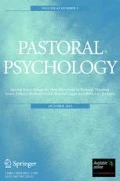Abstract
In this article, I examine patriotism from psychoanalytic and theological perspectives, arguing that it is a deeply problematic form of love and devotion. After providing a brief overview of the discourse vis-à-vis patriotism, I depict the characteristics of a dominant form of patriotism (self-state) in the U.S. Given this, I argue that, while patriotism has a variety of forms, the most prevalent form tends toward tragic consequences and it is this tragic tendency that I depict from psychoanalytic and theological perspectives. From a psychoanalytic perspective, the extant form of patriotism in the U.S. represents a self-state that signifies an idealized, omnipotent, and imaginary identification, which is accompanied by and contingent upon a devaluation of the Other. Moreover, the dominant form of patriotic self-states is secured by weak dissociation, omnipotent thinking and, in most cases, a collapse of the symbolic equation. From a Christian theological perspective, patriotism signifies absolutizing the relative and contingent. This form of idolatry manifests a distortion of reason and will, which contributes to corrupted and corrupting forms of love and devotion.
Similar content being viewed by others
References
Air Force Association. (1995). The Enola Gay and the Smithsonian chronology of the controversy including key documents. Retrieved 3 April 2007, from http://www.afa.org/media/enolagay/chrono.asp
Aron, L. (1996). A meeting of minds: Mutuality in psychoanalysis. Hillsdale, NJ: Analytic.
Bacevich, A. (2002). American empire. Cambridge, MA: Harvard University Press. Chicago: Ivan R. Dee.
Bacevich, A. (2005). The new American militarism. London: Oxford University Press.
Baldwin, J. (1955). Notes of a native son. Boston, MA: Beacon.
Bush, G. W. (2007). Patriotic quotes. Retrieved July 16, 2008, from http://www.usa-patriotism.com/quotes/bush-gw.htm.
Carroll, J. (2006). House of war. New York: Mifflin Company.
Casals, P. (2008). Pablo Casals quotes. Retrieved July 16, 2008, from http://thinkexist.com/quotes/pablo_casals/.
Chomsky, N. (2004). Hegemony or survival. New York: Owl Books.
Dietz, M. (2002). Patriotism: A brief history of the term. In I. Promratz (Ed.), Patriotism (pp. 201–216). New York: Humanity Books.
Farley, E. (1990). Good and evil. Minneapolis: Fortress.
Fergusson, N. (2004). Colossus: The rise and fall of the American Empire. New York: Penguin Books.
Goldman, E. (2008). Patriotism. Retrieved May 22, 2008, from http://www.wisdomquotes.com/cat_patriotism.html.
Gomberg, P. (2002). Patriotism is like Racism. In I. Promratz (Ed.), Patriotism (pp. 105–112). New York: Humanity Books.
Ingram, A. (2002). Constitutional patriotism. In I. Promratz (Ed.), Patriotism (pp. 217–232). NewYork: Humanity Books.
James, W. (1906). The moral equivalent of war. Retrieved August 20, 2008, from http://www.constitution.org/wj/meow.htm.
Johnson, C. (2004). Sorrows of empire. New York: Owl Books.
Johnson, C. (2007). Nemesis. New York: Metropolitan Books.
Johnston, S. (2007). The truth about patriotism. Durham, NC: Duke University Press.
Kaplan, A. (2002). The anarchy of empire in the making of U.S. culture. Cambridge, MA: Harvard University Press.
Kateb, G. (2006). Patriotism and other mistakes. New Haven, CT: Yale University Press.
Liu, E., & Hanauer, N. (2007). The true patriot. Seattle, WA: Sasquatch Books.
Loewen, J. (1996). Lies my teacher told me: Everything your American history book got wrong. New York: Touchstone.
Lundestad, G. (1990). The American “empire.” Oxford: Oxford University Press.
MacIntyre, A. (2002). Is patriotism a virtue? In I. Promratz (Ed.), Patriotism (pp. 43–58). New York: Humanity Books.
McWilliams, N. (1994). Psychoanalytic diagnosis. London: Guilford.
Miller, R. (2002). Cosmopolitan respect and patriotic concern. In I. Promratz (Ed.), Patriotism (pp. 167–186). New York: Humanity Books.
Müller, J. (2007). Constitutional patriotism. Princeton: Princeton University Press.
Nathanson, S. (2002). In defense of “moderate patriotism”. In I. Promratz (Ed.), Patriotism (pp. 87–104). New York: Humanity Books.
Nava, M. (2007). The unconscious and others. In C. Bainbridge, S. Radstone, M. Rustin, & C. Yates (Eds.), Culture and the unconscious (pp. 41–57). New York: Palgrave McMillan.
Niebuhr, H. R. (1941). The meaning of revelation. New York: MacMillan.
Niebuhr, H. (1942). War as the judgment of God. Christian Century, 59, 630–633.
Niebuhr, H. (1943). War as crucifixion. Christian Century, 60, 512–515.
Primoratz, I. (2002). Patriotism: Morally allowed, required, or valuable? In I. Promratz (Ed.), Patriotism (pp. 187–200). New York: Humanity Books.
Ryn, C. (2003). America the virtuous. London: Transaction Publishers.
Segal, H. (1957). Notes on symbol formation. International Journal of Psychoanalysis, 38, 391–397.
Schafer, R. (1959). Aspects of internalization. Madison, CT: International Universities Press.
Stam, R., & Shohat, E. (2007). Flagging patriotism: Crises of narcissism and anti- Americanism. New York: Routledge.
Stern, D. B. (1997). Unformulated experience: From dissociation to imagination in psychoanalysis. Hillsdale, NJ: Analytic.
Tan, K. (2004). Justice without borders. Cambridge: Cambridge University Press.
Tillich, P. (1954). Love, power, and justice. Oxford: Oxford University Press.
Tillich, P. (1957). Dynamics of faith. New York: Harper and Row.
West, C. (2004). Democracy matters. New York: Penguin.
Zinn, H. (1998). The twentieth century. New York: HarperPerrenial.
Zinn, H. (2004). Voices of a people’s history of the United States. New York: Seven Stories.
Author information
Authors and Affiliations
Corresponding author
Rights and permissions
About this article
Cite this article
LaMothe, R. The Problem of Patriotism: A Psychoanalytic and Theological Analysis. Pastoral Psychol 58, 151–166 (2009). https://doi.org/10.1007/s11089-008-0179-1
Received:
Accepted:
Published:
Issue Date:
DOI: https://doi.org/10.1007/s11089-008-0179-1



